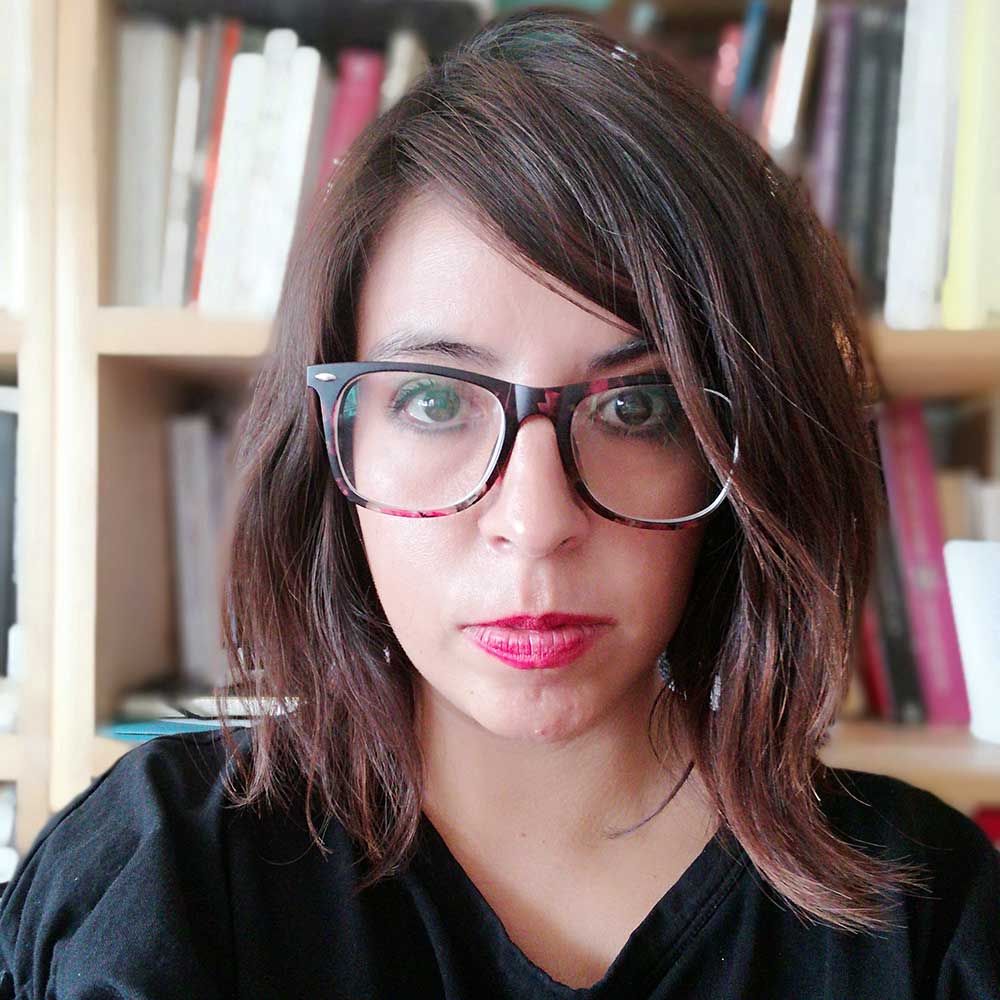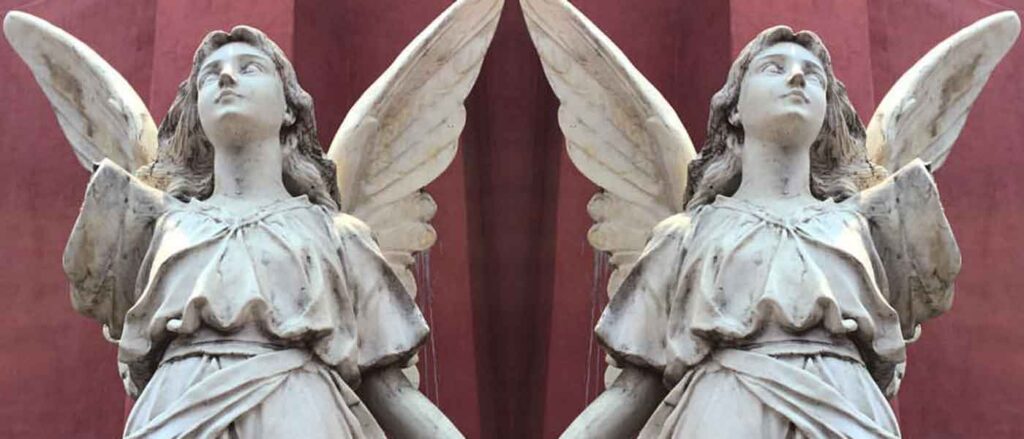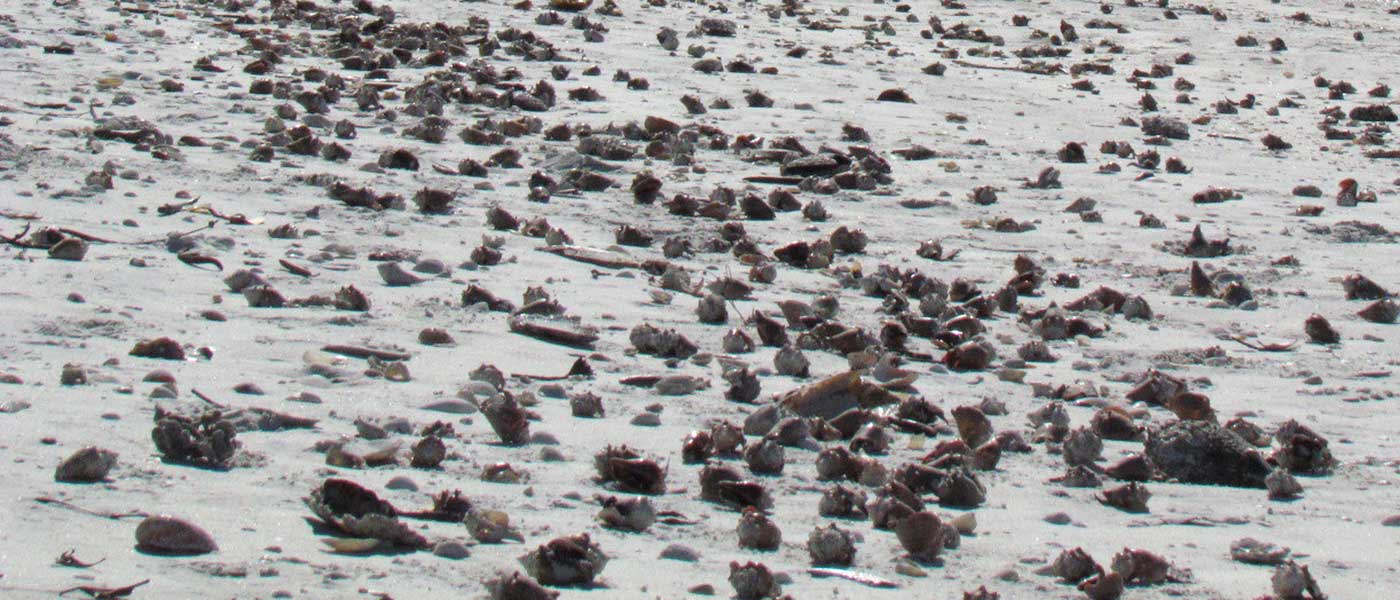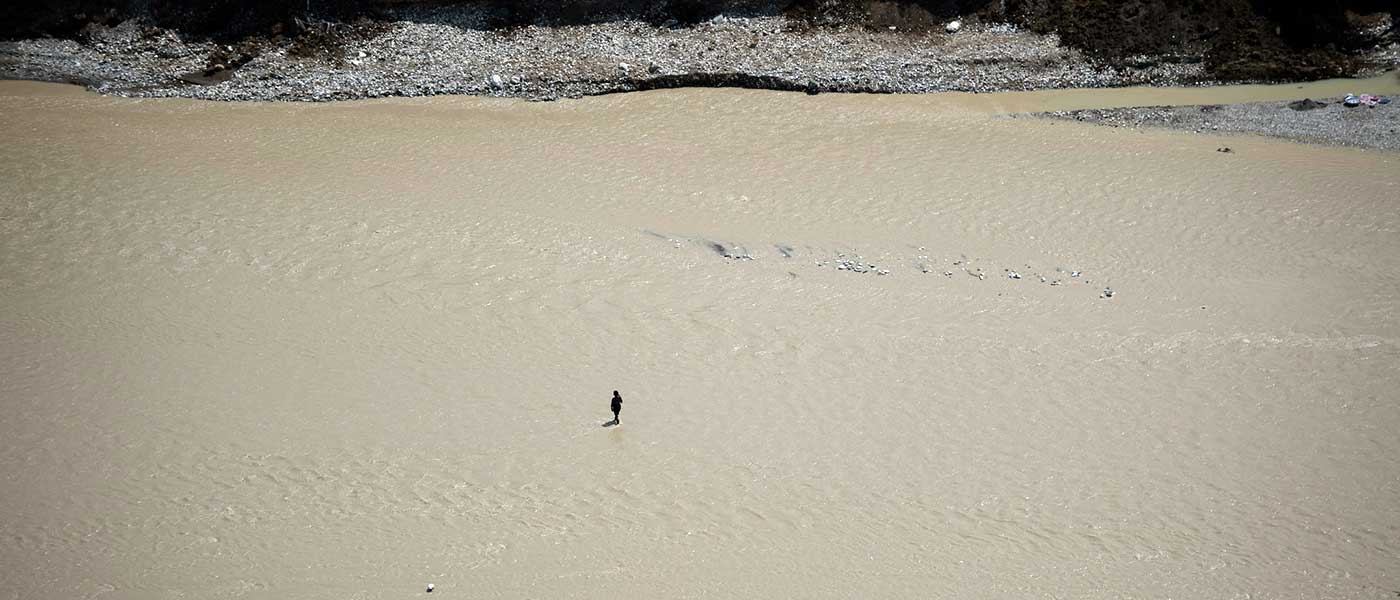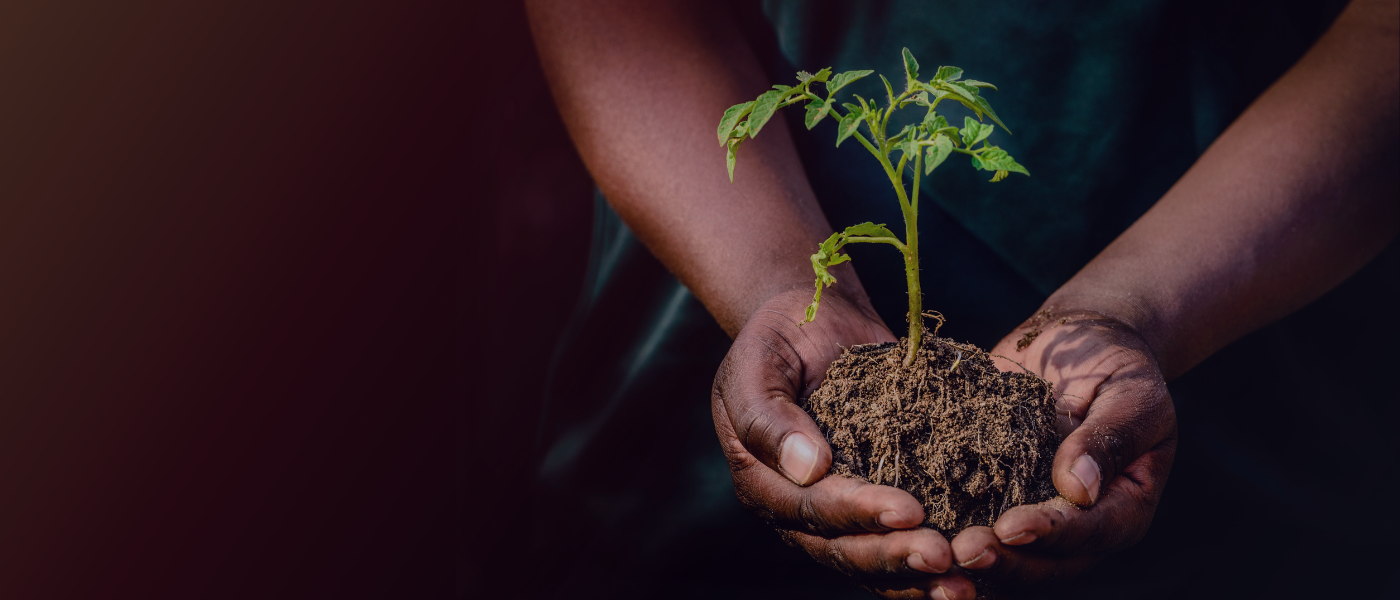Hers is a country of dead people. All those graves scattered over the hill, the white crosses, the angels with their hands on their chests, the pinwheels that spin over children’s graves. So much space dedicated to remains. In her country, people acquire visibility once they are dead. And these right here are lucky enough to be buried in a tomb of their own, with their names on the tombstone, unlike so many others, hidden in common graves while their families continue the endless pilgrimage of trying to find them. A whole country of desaparecidos is not a country; it’s a tumor. She is fortunate, privileged enough to know why she is there and where her grief lies. The privilege of a natural death.
She won’t cry. She won’t look back at the coffin where she lies, or at least her features do: her nose, her eyebrows, her bangs. She always liked having a twin sister, but to look at her sister resigned over the sateen, to look at herself dead, is too much.
She should have asked for a closed casket but her sister was terrified of being trapped inside a closed box. Let them burn me, let them burn me the day I die. But it couldn’t be done. Some law stated that a body couldn’t be cremated until it had been dead for twelve hours. Bullshit, she thinks. In Mexico one can’t even choose how to get the hell out of this life. You said: I don’t want a deathwatch, and yet here we are.
The room is empty. She wishes she could walk for a while down by the graves but she doesn’t dare leave her sister alone and she is by herself with a dead body that looks exactly like hers. Her reflection is her sister’s, like in the photographs they used to work on. She wishes she could get Arbus out of her backpack, but she doubts that rats are allowed at funeral homes. Her sister was lucky as well. She was privileged. She didn’t disappear like so many women do. She wasn’t killed. She died. That makes all the difference in the world.
Cancer tunneled through her sister’s body and she only found out when it was too late. It was while they worked on their Female while in Mexico project: two identical women disrupting the voracity of the urban landscape, two women naked to invade cities, to claim them. One woman held the camera, a double-lens Yashica, and the tungsten lights, while the other woman who was the same woman stood where no Mexican naked woman should stand if she wanted to stay alive: a subway tunnel under the Zócalo, a place where feral children lived, a junkyard of heavy machinery outside Ecatepec, the roof of an abandoned building in Santa María la Rivera, or against the rusty metal border wall covered in pink crosses in Ciudad Juárez.
Her sister lived with cancer for a couple of years and she kept saying: run down the tracks of La Bestia that takes migrant workers to the north, get naked, ISO 3200, f.4.5, speed 60. The cancer came out on the left breast and creased the skin as if burnt. The cancer came out on the neck swollen like a jellyfish. What is it? What’s wrong? We should see a doctor, we should cut that off you, we should jump off a bridge. The sister wanted nothing: I’m leaving. You can’t leave. I am. You can’t leave now that I am pregnant. You can’t be pregnant now that I am gone.
She knew then that life won’t come while death is near. And for the first time she went down the tunnels by herself: alone she got into the sewers, alone she set the tungsten lights, alone she started the automatic shutter and ran into the frame, alone she stepped on glass and sat by the side of the abandoned subway tracks, alone she saw the first light of the sun bleed down through the cracks of a vent and later heard the laughter of children, alone she understood that the tunnel was under a playground.
Her sister slowly stopped moving. She got small, minuscule. Her lips retreated from her teeth. Her eyes looked inwards. And so she sat by her sister’s side: Eat. I don’t want to. Drink. I won’t. We should get another doctor. I’m leaving. Eat. No. A sip of water, come on, don’t spit it out, take this pill, this syrup. I want to go, help me. Lie down for a while, sleep, are you afraid of sleeping? I don’t want to suffocate. Don’t lie down then, walk a little, look at those ulcers on your backside. Push me down the stairs. Your friends want to see you, should I let them in? Maybe they’ll agree to push me down the stairs. I’ll tell them to come back later, you are tired. I am dead.
She removed all the mirrors she could find but her sister looked for her reflection in the back of spoons. Don’t look at yourself like that, wait until you get better. Take my picture. No. Take a picture of the tumors, of the flesh. No. Then give me the Yashica. Open your mouth, eat a piece of melon and I’ll give it to you. Give it here! Why do you torture me? I feed you. You keep me alive. I do. Don’t be afraid. Give me the Yashica or take my picture! What are you doing? Get dressed, you’ll catch your death. Take my picture like this, naked, like we used to.
She saw the body of a lost battle, the left breast invaded by a fleshy scorpio that pleated the skin as if sucking it, the onion that lodged itself under the skin of the neck, the feet swollen like palm tree trunks, the chalky teeth, the belly big on one side only.
God, she said, and for the first time, she meant it.
Take my picture. She got the Yashica, freed the double lens, lifted the metal cover and wanted to lunge herself inside the visor and never come out, she wanted to bounce on the inside mirror, get through the final orifice and get lost in the gelatinous film, stuck like a rat in a paper trap. Clack! and the last image of her sister went to hide where she couldn’t.
By the end, her sister wouldn’t get up from her armchair. Her head got too heavy for her neck. She didn’t sleep. She was afraid of dying while she slept. Maybe she regretted having said nothing, having done nothing. She cried or water dripped from her bangs.
She was dying of fear. She trembled from the skin inwards. It’s fear that kills you, in the end. She sat by her sister’s side all day and night, she stopped trying to feed her, she stopped giving her water: go, linda, go. Don’t be frightened, close your eyes for a moment, let your head rest. No, the sister signaled with a finger, no. Her breath stopped for half a minute and for the second time: God! But it came back. Go, bonita, you’ll see it’s easy, don’t be afraid, and she ran her fingers through her sister’s hair. No, insisted the finger. She was about to get up when her sister, her finger, said: no. She sat back down. The sister then let her tilt her head to rest on the armchair: don’t be frightened, up and ahead, let go, up and ahead, you are doing great, you are doing beautiful, linda, up and ahead. The sister sighed and then nothing. She kept caressing her hands: you are doing wonderful, querida, so good, let go, move forward, up and ahead. She’d read these words somewhere and they came to her naturally: up and ahead, bonita. Up and ahead, you are doing great, beautiful, don’t fear, look how easy it is to let go, I’ll be fine, I’m not afraid, don’t be afraid. Far. Up. Ahead.
We’ll soon be home. We should move away. This is not a country. This is a clot. I shouldn’t have brought you. This is no place for a girl. This is the best place for a girl. I want to leave. Let us go home, then.
She was there for a long time although she knew that her sister was tied to her own body just by the hands. Up and ahead, bonita. Up and ahead, she almost sang now, up and ahead. And when she felt that her sister only held on to life by a fingernail, she broke contact and let her hands go. It was all over and for the third and last time she said: God.
